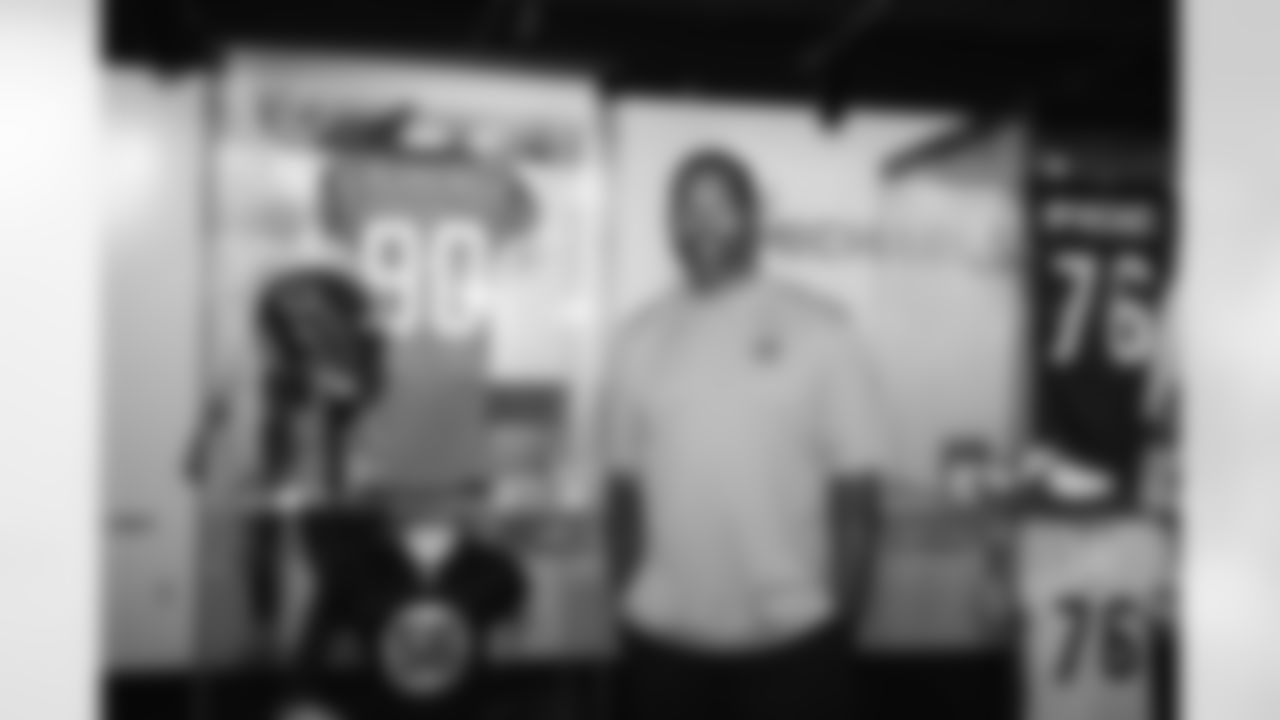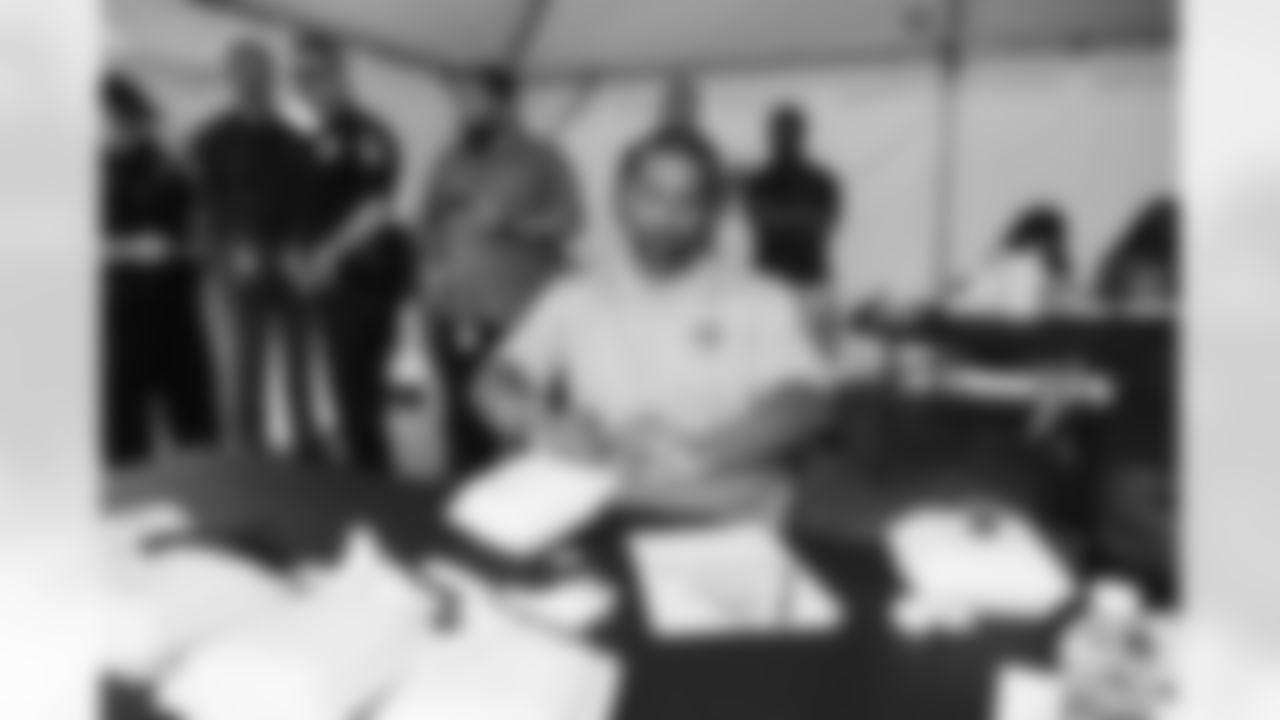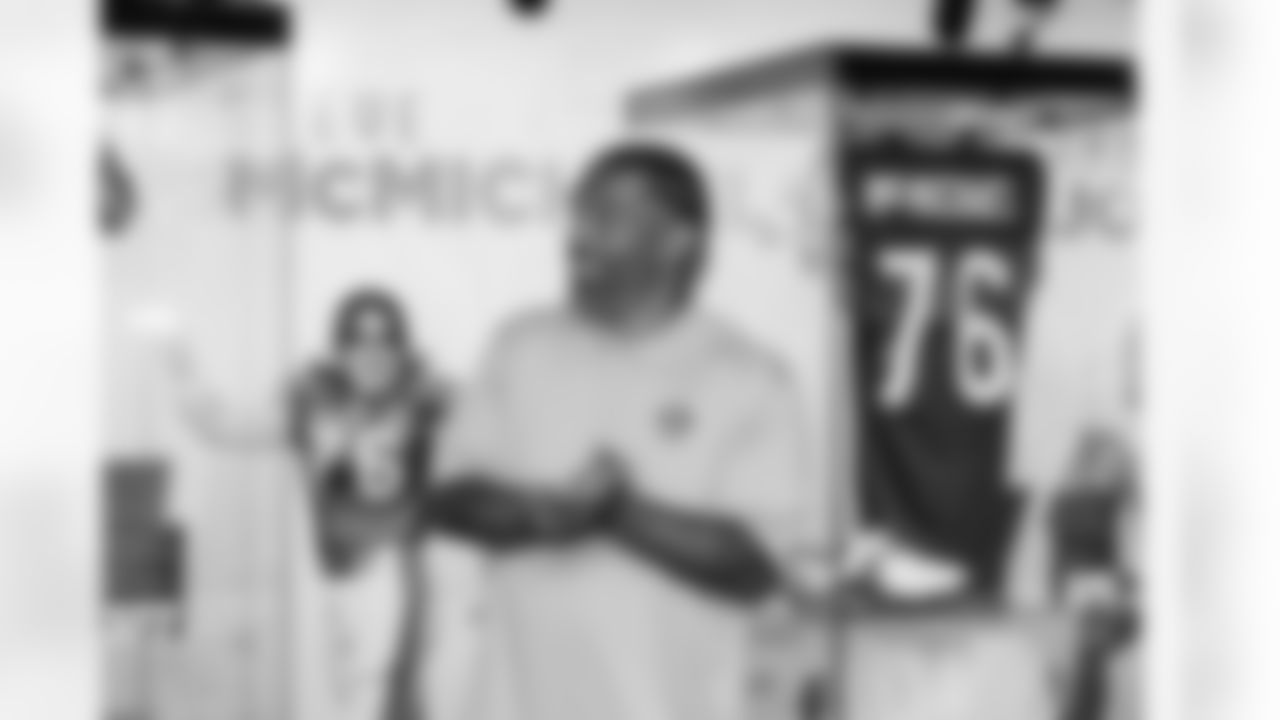CHARLOTTE — In practically every other area of the game, Julius Peppers could fill up a stat sheet.
He had 159.5 sacks (fourth all-time), 52 forced fumbles (second all-time), and 13 blocked kicks (10th on the unofficial all-time list).
But it's the one column on the back of his football card with a zero that still confounds coaches and teammates, who can't imagine how it never quite came to pass.
Or that he never received a pass.
"It's probably my fault," former Panthers quarterback Jake Delhomme said with a laugh. "I mean, listen, I had no trouble throwing something towards the back of the end zone or a back-shoulder to a 5-foot-9 stick of dynamite like Steve Smith. I had no trouble doing that. I had no trouble throwing it to Muhsin Muhammad. But to Julius, it's like, I don't know.
"It's like, what's going on here? It was so easy going to Steve and stuff and it seems so easy. It was like, did you miss the wide-open layup? Is that what I'm doing every single time? Am I missing the wide-open layup?"

It's appropriate that Delhomme used the basketball analogy, as the same gifts that allowed Peppers to star on UNC's Final Four team were the things they thought were going to translate to catching passes. Others made that college basketball-to-tight-end transition (like Tony Gonzalez and others), and Peppers just happened to be bigger and stronger than all of them.
"We felt like a guy who played in the Final Four in basketball and was the number two pick in the draft, proportioned at 6-foot-7 like he was 6-1 and could run like he could run, and he had hands that would envelop the football. We just thought we could use him to do a few things," former offensive coordinator Dan Henning said, and it makes perfect sense when he says it like that.
The Panthers experimented with Peppers as an offensive target on a routine basis, beginning his rookie year. The temptation was obvious. It just never quite came together for reasons that are never as simple as one thing.
He'd line up occasionally, but the only two pass attempts thrown his way in a Panthers uniform were in 2004, at Atlanta and at New Orleans. When looking back at the attempts (look at the 6:15 mark of this video and the 0:51 mark of this one), Delhomme said he graded out halfway, one of them an acceptable attempt, one a bad throw on his part. In 2005, they brought Peppers in at the goal line, but offsetting pass interference penalties on him and Patriots safety Eugene Wilson wiped out that chance.

And liberated by time, head coach John Fox, the guy who could equivocate about the weather even if he was standing in a downpour, seemed to have a prime suspect.
"Well, you've got to remember too, there's a throw involved as well," Fox said with a laugh.
(That bump you just heard was Delhomme being thrown under the bus, 20 years after the fact. )
"I don't remember all of them, but I'm not going to sit here and say, hey, they're all perfect strikes," Fox said. "But it was, it was really a good plan."
And it was a plan with a basis in fact.
Peppers was big. He could catch. He played running back in high school and considered being a tight end at UNC until he realized he was stuck behind a future NFLer in Alge Crumpler and figured he might as well play defense. (It was a good call, as he's going into the Hall of Fame on that side of the ball. But the point stands.) And, he routinely intercepted passes, sometimes one-handed, so he demonstrated the ability to catch flying things.

So, as soon as Peppers got here in 2002, Fox and Henning started drawing plays in the dirt.
They figured putting the 6-foot-7, 290-pound Peppers on the outside was going to do a few things to an opposing defense, almost all of them good.
If they left a little defensive back over there (like the Patriots did with the 5-foot-10, 200-pound Wilson), you could throw a jump ball and take a shot.
If they doubled the biggest tight end in the league with a linebacker, that meant you had a light box and could run the other direction with great effect (and this was always Fox's preference). When he'd go in, it was part of their two-back, two-tight end personnel which they called "New Jersey," which left just one other wideout on the field.
"For the most part, we did so we could run the other way, right?" Fox said. "But it was really a good little deal. If anything, he still accounted for a lot of touchdowns because of the design."
Henning, whose knowledge and recall of football remains encyclopedic, said he had visions of a bigger Kellen Winslow (the former Chargers tight end and Peppers' now-teammate at the Hall of Fame). And since their first rule was to throw to the single-covered receiver if possible, they figured it had a chance.
"To this day, if I had to pick a group of wide receivers from that team, he would have been in there with Steve Smith and Muhsin Muhammad," Henning said with conviction. "And probably right with them when it came to inside the red area because of the natural advantages he had with his size and ability, and he was a smart guy to begin with."

Asked if he ever watched practice and daydreamed about working with a player like Peppers on a more routine basis, Henning cackled.
"Did I ever do it? I did it every day," Henning said. "I mean, as a tight end, the guy would have been spectacular, but that's not what he was doing when he was playing college football.
"He was a guy who played in the Final Four at North Carolina. We're not talking about some guy at East Tennessee State or one of these schools that just happened to get in it one year. Just to make it on the team at North Carolina said a lot. You've got to be a great athlete in basketball and here he is playing in the Final Four."
Before Fox could ask, Henning said he approached Peppers one day on the practice field and asked if he'd consider being a trick-play option, and the look in Peppers' eye made it clear he was up for it.
"It was a non-verbal thing, but it was clear," Henning said. "He definitely wanted to."
And when Peppers would enter a huddle, it also created a sense of excitement in his teammates, as well.

Left tackle Jordan Gross, who saw what kind of athlete Peppers was every day in pass-rush drills, could only imagine how it would work (same as the rest of them).
"I just remember the coolness factor of all of us going up when he was in the huddle," Gross recalled. "I'd had him on as a teammate or I've been out for the coin toss as captain, but I never had him in our huddle. And I was like, oh man, we were all excited. Like, this is sweet.
"You know something cool is going happen, or at least look cooler. And then, it just never came to be; it shows you how hard that jump ball deal is.
"But when it would happen, we all wanted it because we were fired up when he'd come in on offense. It was cool."
If Peppers was excited (and according to Henning, he clearly was), he didn't show it.
"He just kind of came in the huddle, wouldn't even say hi to anybody, like here we are. You'd kind of think somebody would come in, be like 'Yeah guys, let's go!' But nah, it was just like OK, I guess they want me in here. What am I doing? That? Great.
"It's a shame, really. It wasn't for naught, but it didn't turn out as cool as we wanted it to be."
On the other hand, it definitely caused a stir on the other side of the ball.
"He would create a buzz because here's the thing about Pep," Gross said. "That was like one of the coolest things being on his team, is how infatuated other players were with him, like after the game or before the game, just like loving up on him.
"He's just such a different species than the rest of us, you know? So when he'd come in the game, it was the same thing. The defenders weren't used to having to deal with him, and they didn't know what to do."

That kind of reaction was also a useful tool in practice when Peppers would get a few reps each week when they went over special situations.
Defensive coordinator Mike Trgovac was aligned with Fox in that it was most likely a run play, but it also became a test for his defense's recognition. He remembers in advance of that Patriots game in 2005, knowing Wilson couldn't cover Peppers and wondering if the Patriots might have tried turning tight end Rob Gronkowski into a safety if they had time to prepare for it.
"I said I love it because I knew one thing: I would not want to have to defend that," Trgovac laughed. "I looked at it from, I looked at it from my avenue of a defensive coach and said, how the hell am I going to defend this? I mean, here's a guy that's 6-7 and can jump out of the barn, and he's got hands like any tight end you can imagine."
Of course, there's another element to experimenting with one of the greatest defensive players ever on offense — somebody had to explain it to one of the existing players on offense, all of whom assumed they were one of the greatest offensive players ever.

Hall of Honor tight end Wesley Walls — who was never bashful about letting people know when he wasn't getting enough targets — laughed and remembered feeling some sort of way in 2002 when they brought the rookie in and took the veteran out for a rep in practice.
Walls caught 450 passes for 5,291 yards and 54 touchdowns, and he remembers every one of them and grieves over the ones he didn't get the chance to catch.
"I remember one day in practice we were doing red zone, we get in our goal line package," Walls began. "Somebody says, we've got a new play, we'll take you out, and we're going to put Julius in. We're just going to lob it up in the back of the end zone.
"Now, I don't know if I like that. I like that other one, 'K Four Y Corner,' that was always a good one for me. But they put him in, threw it up and he caught it in practice. I'm like, oh my goodness, you've got to run that play. There's no way they can cover it."

Hall of Honor classmate Muhsin Muhammad just grins when he thinks about Peppers as a receiver, similarly believing he could have been a dangerous one with time and reps.
And like Walls, he has a qualified opinion, having caught 860 passes for 11,438 yards and 62 touchdowns.
"Was he capable? Probably. But he was a defensive end," Muhammad said. "If Julius wanted to play tight end, he could play tight end. But Julius wanted to play defensive end and he's going to the Hall of Fame. That's all you've got to say."
But again, being in 22 personnel meant somebody who was used to catching a pass in the red zone was losing an opportunity.
So Muhammad was asked who would be the most upset to lose a chance like that: himself, Walls, or Smith, the three pass-catchers in the Hall of Honor alongside Peppers.
"The answer is yes," Muhammad said with a laugh. "All of the above. The answer is yes. Absolutely."

We had visual evidence of Smith's feelings on the topic, at least.
He was hurt in 2004, suffering a broken ankle in the opener that caused that team to struggle. And his absence helped clear the way for Peppers' chances in December 2004, since the Panthers weren't overburdened with alternate targets to Muhammad.
Smith also finished his career with 1,031 catches for 14,731 yards and 81 touchdowns, so he was pretty good at this.
So in that Patriots game in 2005 — the year Smith won the triple crown by leading the league in receptions (103), receiving yards (1,563), and receiving touchdowns (12) — he was the guy who came off the field in goal line to make room for Peppers.
It did not go well.
Smith jerked his helmet off and spiked it into the ground with two hands. It bounced and nearly took team security guard JC Felder's head off in the process.
He was not pleased then, but, with the benefit of age and wisdom, can understand and show a sign of grace.
"I hated it then, because I didn't get a lot of passes in the red zone," Smith admitted with a laugh. "The funniest part now, as a 45-year-old Steve, with the draft stuff that I'm doing now, I see why. Because yes, I can jump out the building, but you know the numbers analytically favor the 6-foot-7 guy.
"You know, going backwards now and looking at it, I think we probably should have done it more."
Can you imagine how that might have worked?
I mean, Peppers might have turned into a first-ballot Hall of Famer.
See photos of the Panthers Legend as he tours his Hall of Fame locker at the Pro Football Hall of Fame in Canton, Ohio, and tastes some local delicacies at a BBQ competition.









































